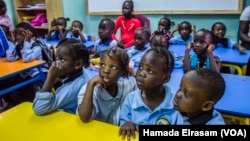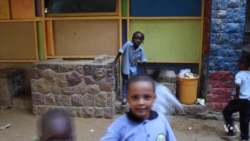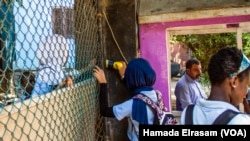Teachers and volunteers in Egypt are using a mixture of patience and kindness to educate refugee children from nearly a dozen African countries. International organizations like the UNHCR, local and international NGOs, and church groups also contribute in the struggle to educate the children.
Most of the children have the same aspirations as other young people the world over, but they also face obstacles that children elsewhere do not.
Chris Rupke, an educator at the African Hope School in the Cairo suburb of Ma’adi, says the African refugee children he works with have often lost one or both of their parents and are living with extended family members.
WATCH: African Refugee School in Cairo Struggles to Educate Children
“Some of the children are fortunate to have one parent,” he said, while others “might be living with aunts or uncles, or living with tribal members [whom] they call aunts or uncles. Nuclear families, as we know them in the West, are not that common here,” Rupke said.
Too traumatized to speak
Memories of what the children endured before fleeing to Egypt are often a heavy burden to some of them. Rupke recalled one little boy who was so traumatized that he was unable to speak until a psychologist at the school got him to draw pictures of what had happened to his family.
The volunteer psychologist began by asking the child to draw his village, Rupke said, “and he drew his village, and he drew his father and his mother and his siblings, and they were in pieces. When she asked, ‘Where’s your father?’ he pointed to some pieces on the ground.” From that point on, the little boy slowly began to talk and express himself.
Rupke remembers another little girl who came to school with burn marks on her face. As it turned out, she was being “disciplined” by an aunt. Educators at the school persuaded the aunt to stop, but the next year, she refused to enroll the child in school, as punishment.
“That kept her out of school for a year,” Rupke said, “but this year, she was allowed to come back … and the little girl is a delight, always laughing, always enjoying life.”
Why they come to school
Other teachers, like Jean-Pie, who comes from the Democratic Republic of the Congo, tells VOA that when he began teaching at the African Hope School in 2003, he and his colleagues went searching for African refugee children under Cairo’s bridges and in its public gardens, where they were camped out. He eventually honed his skills at persuading them to come to school.
“We have a school here,” he would say, “so, we can put you there [and] it’s free.” The strongest enticement, though, is that the school serves free meals. “When they hear about food,” Jean-Pie said, “they come.”
Putting food on the table is a constant struggle for African refugee families. Refuge Egypt, a nongovernmental organization run by the Anglican church in Cairo, helps them with free sugar, flour, cooking oil and other staples. Refuge Egypt also provides free medical treatment and some medications at a health clinic it runs. Most of the doctors and nurses volunteer their services.
Crucial card
Remaining in Egypt can also be a struggle for many African refugees, until they receive an “asylum-seeker card” from the U.N. refugee agency.
UNHCR’s Cairo spokesman, Tarik Argaz, tells VOA the card “protects refugees from being deported to their home countries and allows them to regularize their stay in Egypt.” A 1954 UNHCR agreement with Egypt also allows refugees from some countries to register their children in local schools and be treated by Egyptian government-run medical facilities.
Practically speaking, though, Egyptian government schools are too crowded to accept many refugee students. Some do not speak Arabic, which can make it difficult for them to adapt to the local curriculum. For that reason, there are close to 60 schools for refugee children in Egypt, like African Hope.
Subjects at most refugee schools are usually taught in English. Teacher and supervisor Hella tells VOA that students at African Hope “are taught math, Arabic, science, literacy, social studies, computers and personal development.” Some of the students tutor their Egyptian counterparts in English.
Despite the struggles to cope with life in exile, most refugee children relish the opportunity to go to school. They love to play with their schoolmates, to have fun and to learn. Classrooms at African Hope are cramped and its 460 students attend two different sessions, but teachers work hard to help them to learn, and do it with love.
“We do know that the students love to come here,” Rupke said, “because they know that it’s a safe place, and it is a place that they will see love. They will see teachers that care about them and love them and are here to help them to grow into young men and young ladies that are able to make responsible decisions in life.”







